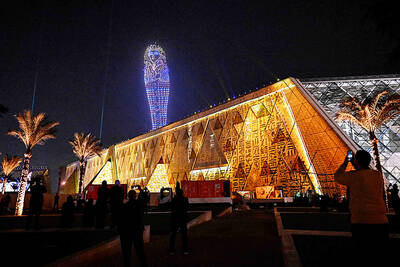Iran proclaimed yesterday that it was no longer committed to the agreements made last October with the EU trio of Britain, France and Germany and would resume uranium enrichment.
"We made an agreement with the European Union trio last October in Tehran, which also included a temporary halt to uranium enrichment, but as the Europeans were not committed to the Tehran Declaration, therefore we also lift the temporary halt to uranium enrichment," Hassan Rowhani, Iran's chief negotiator on nuclear issues, told reporters.
Rowhani gave a press conference yesterday morning after the International Atomic Energy Agency (IAEA) issued a resolution on Friday criticizing Iran for failing fully to disclose the extent of its nuclear program.
"Details on Iran's new uranium enrichment program will be announced in the coming days," said Rowhani, who is also secretary of the Supreme National Security Council.
"We do not pay much attention to the new resolution as the whole issue has once again been politicized with the final aim to deprive Iran of peaceful nuclear technology," he said.
He blamed the IAEA for poisoning the atmosphere in Vienna against Iran with false information, referring to IAEA charges that Iran had not informed the IAEA about its importation of 150 magnets for gas centrifuges used in uranium enrichment.
The IAEA later admitted that its initial claim about the importation of magnets was not correct and Iran in return demanded a change to the critical resolution.
"We however continue cooperation with the IAEA but stress settling the dispute over Iran's nuclear program at the earliest term and without politicization," said Rowhani, who is also a potential candidate to succeed Iranian President Mohammad Khatami next year.
Rowhani also said Iran would not withdraw from the Nuclear Non-Proliferation Treaty.
Iran had even agreed on further IAEA inspections in Arak and Isfahan in central Iran, where a heavy water reactor is planned and where nuclear pollution had been reported by the inspectors, he said.
"The new resolution has not created any new commitment for Iran and there will also be no halt to the heavy water reactor plan in Isfahan," he said, referring to an earlier demand by the EU trio.
The cleric reiterated that, contrary to US claims, Iran had no secret plans for nuclear weapons, adding "the IAEA acknowledgement of this fact has left only a few pages left from the rather very thick Iranian nuclear file at the beginning."
The IAEA unanimously passed a resolution on Friday criticizing Iran for failing to fully disclose the extent of its nuclear program.
International investigators from the Vienna-based UN watchdog had been given contradictory and incomplete information, the agency said.
The strongly worded resolution is a stinging rebuke to Tehran but stops short of threatening Iran with UN Security Council sanctions.

‘CHILD PORNOGRAPHY’: The doll on Shein’s Web site measure about 80cm in height, and it was holding a teddy bear in a photo published by a daily newspaper France’s anti-fraud unit on Saturday said it had reported Asian e-commerce giant Shein (希音) for selling what it described as “sex dolls with a childlike appearance.” The French Directorate General for Competition, Consumer Affairs and Fraud Control (DGCCRF) said in a statement that the “description and categorization” of the items on Shein’s Web site “make it difficult to doubt the child pornography nature of the content.” Shortly after the statement, Shein announced that the dolls in question had been withdrawn from its platform and that it had launched an internal inquiry. On its Web site, Le Parisien daily published a

China’s Shenzhou-20 crewed spacecraft has delayed its return mission to Earth after the vessel was possibly hit by tiny bits of space debris, the country’s human spaceflight agency said yesterday, an unusual situation that could disrupt the operation of the country’s space station Tiangong. An impact analysis and risk assessment are underway, the China Manned Space Agency (CMSA) said in a statement, without providing a new schedule for the return mission, which was originally set to land in northern China yesterday. The delay highlights the danger to space travel posed by increasing amounts of debris, such as discarded launch vehicles or vessel

RUBBER STAMP? The latest legislative session was the most productive in the number of bills passed, but critics attributed it to a lack of dissenting voices On their last day at work, Hong Kong’s lawmakers — the first batch chosen under Beijing’s mantra of “patriots administering Hong Kong” — posed for group pictures, celebrating a job well done after four years of opposition-free politics. However, despite their smiles, about one-third of the Legislative Council will not seek another term in next month’s election, with the self-described non-establishment figure Tik Chi-yuen (狄志遠) being among those bowing out. “It used to be that [the legislature] had the benefit of free expression... Now it is more uniform. There are multiple voices, but they are not diverse enough,” Tik said, comparing it

Prime ministers, presidents and royalty on Saturday descended on Cairo to attend the spectacle-laden inauguration of a sprawling new museum built near the pyramids to house one of the world’s richest collections of antiquities. The inauguration of the Grand Egyptian Museum, or GEM, marks the end of a two-decade construction effort hampered by the Arab Spring uprisings, the COVID-19 pandemic and wars in neighboring countries. “We’ve all dreamed of this project and whether it would really come true,” Egyptian Prime Minister Mostafa Madbouly told a news conference, calling the museum a “gift from Egypt to the whole world from a